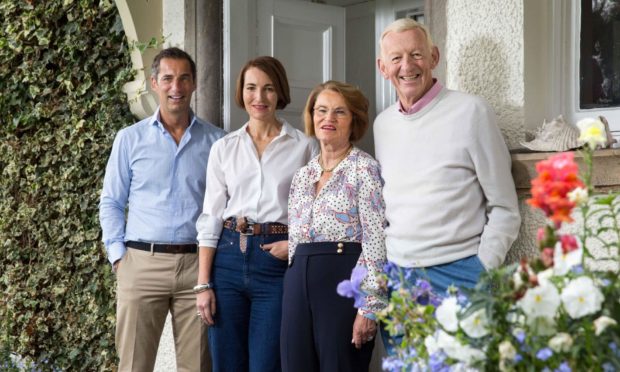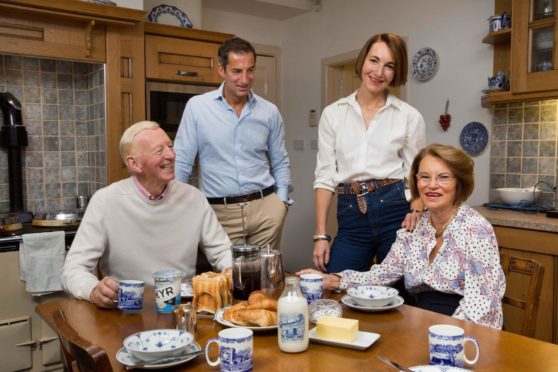Looking back on 12 months in a pandemic, Dr Robert Graham and his daughter, Carol, from Graham’s The Family Dairy, talked to Rebecca Shearer about what this meant for their business.
Firms and companies in all corners of the hospitality industry – from producers to chefs – saw their business models change overnight on March 23 2020 when the entire nation went into lockdown.
But while many places haven’t been able to remain open for much of the past 12 months, one firm that was able to adapt and still be there for their customers when they were able to reopen was Graham’s The Family Dairy in Bridge of Allan.
At the start of the first lockdown, the dairy firm was hit hard after losing 1,800 customers, mostly restaurants, cafes and hotels, overnight.
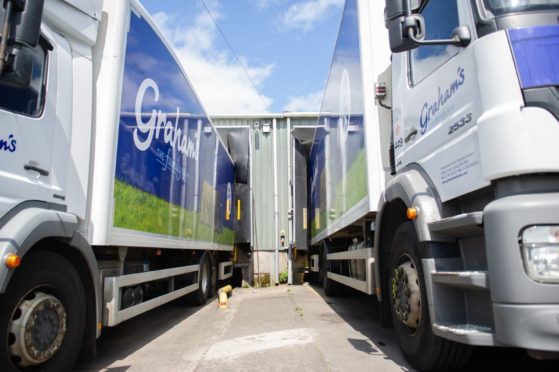
Loss of core customers
Carol Graham, marketing director, said that after losing some of their core customer base, the business was able to shift its priorities and find new ways to adapt.
She said: “When lockdown happened, overnight we lost 1,800 of our customers in terms of hotels, cafes and restaurants. The first thing we did at the time was really ensure the safety and wellbeing of our people and our customers.
“Our priority right at the start, was really keeping our milk production going. We picked up milk from all of our farmers, delivering products to all of our retailers to ensure there were products on shelves. Around that time there was a lot of anxiety in terms of whether the supermarket shelves would be empty.
“The retailers started an initiative called Feed The Nation, and we became part of that. It was really to reassure people that there would be products on the shelves. March 2020 and part of April was really dealing with that.”
Dr Robert Graham Snr, chairman, Graham’s The Family Dairy, emphasised that despite there being many challenges associated with lockdown, the firm prided itself on being able to still support their farmers.
He said: “As you can imagine, it was a shock to the system. One day we’re going along fine, as normal, then all of a sudden these places have to close – the cafes, restaurants, small hotels and big hotels.
“But the milk kept coming in. We didn’t let any of our farmers down, we took in all the milk, which was a big ask for us to do at that time.”
Doorstep deliveries
Carol also added that they brought in a new model of delivering their milk – to doorsteps across the country.
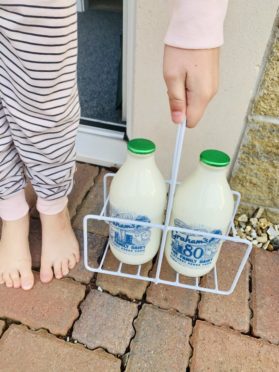
She said: “We very quickly mobilised our teams across the country to be in a position to offer a personal doorstep delivery service to more people and areas across Scotland who were affected by lockdown.”
Butter business
Also back in April 2020, consumer uncertainty around how much food was going to be available in supermarkets led to unexpected growth in the butter side of the family business.
Dr Graham added: “We’re very fortunate that we have our own large butter plant – we’re the only dairy in Scotland that makes butter and as soon as the milk goes through the door, it can be made into butter within 12 hours.

“We set that up with double the production and focused more on making butter than making milk. We were quite fortunate going forward from there with the lockdown as everybody started baking – their mothers, their fathers, sisters, brothers, everyone. Initially we had this huge stock of butter which we were making and wondered what we were going to do with it.
“We’d normally do about 75 tonnes of butter a week, but that increased to 150 tonnes a week – which is quite a lot of butter to be spreading on your piece!
“Then it kicked in that people started baking. So, all of a sudden, our extra butter stock started to decrease, which was great and sales doubled.”
Carol also said that their big retail customers were really helpful for the firm, as well as the trend that emerged around baking at home.
She said: “We’re also very fortunate that we have a spread of customers – the hotels, restaurants that we supply and all the big retailers. That was really helpful for us. While the doorstep deliveries made up for a small portion, that wasn’t the volume. People were buying a lot in supermarkets.
“At the beginning there was a lot of panic buying, even of dairy products, so there was an unpredictability on sales. So, right at the start of the lockdown, there was no buying pattern. We couldn’t predict how much milk customers were wanting. One week sales might be really high, the next – because customers had essentially over-bought – sales would be low.
“But for the first few months, certainly, what we also found was people were buying mainly milk and butter. So, our high protein products such as our Skyr and yoghurt ranges, sales of those decreased as people focused on the basics.
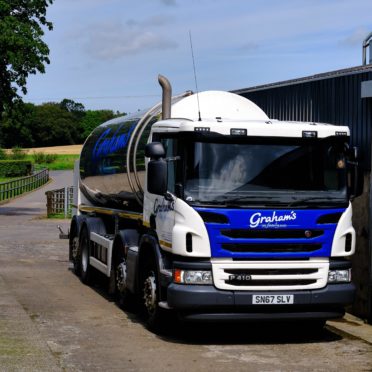
“Families were together but they were also apart, and it increased the amount of baking that was going on. The most Googled recipes were things like banana bread, so in terms of our marketing, we brought it back to our brand values and reinstated ‘From our family to yours’.
“Mum and dad, like every other grandparents, weren’t seeing their grandchildren.
That’s why we launched the Cooking Together Apart campaign – where grandparents were baking with their grandchildren via FaceTime. We built the campaign around that to bring that connection from our family to other families.”
Milk ambassador
In the summer, many of Graham’s The Family Dairy customers began opening up their businesses, and the team were right there to help them all get back on their feet.
Carol said: “When things started to open up we wanted to support them. So we ran a campaign to find a milk ambassador and to encourage people to go back to their independent coffee shops.
“We did that over the summer as well as reinforcing all of our brand values and our taste credentials. So we did a campaign around ‘What makes Graham’s taste so great?’ which dad heads up as we’ve done that before.
“We really wanted to communicate that to reinforce that trust and care in the product. That’s something that we’ve focused on throughout the last 12 months, to make sure that messaging was really clear. I think there’s so much uncertainty and I think when consumers go into a supermarket, they want to understand the brand that they’re buying and trust it.
“It really wasn’t until late summer that the sale of things like Skyr started to pick up. I think people gained more confidence.”
Another boost to the firm came in August, when they were named the number one food brand in Scotland, overtaking previous top Scots, Irn-Bru.
Carol added: “In August we became number one Scottish food brand, where we overtook Irn Bru for the first time. That 70% of Scottish households now buy Graham’s is incredible.
“For decades now, we’ve always been about bringing out new products. We’re always looking at where we can either extend our range or go into different categories.
“Our new product development has been a driver in terms of sales and growth.”
Taking on the tiers
In the late summer, early autumn, the Scottish Government began implementing a nationwide tiered system, meaning that many of Graham’s Dairy’s customers once again had to close their doors, though the business was still able to adapt.
Carol said: “Anything that affects restaurants and cafes also affects us. It’s just about working out the pattern of it. The spread of our customer base gave more certainty to the business when the tier system came in.
“I think that’s one of the strengths of being a family business, it’s that we can make decisions really quickly and we can act really quickly. So when the tier system came in and we lost some of those customers, we could adapt. We redeployed sales teams to our home deliveries, for example.”
Dr Graham added: “I think it was unfortunate for the customers, these hotels and restaurants, as they had put a lot of effort into getting opened up – it was the same with ourselves. We would hear the disappointment coming from the customers saying about how they were having to shut again. So there was really an amount of concern on them, not just us as suppliers.
“But, we couldn’t let the farmers down. The milk’s coming in so we had to make plans and adapt.
Carol continued: “Throughout this time, 100% of the milk was collected from all our farmers – we didn’t lose a day of production.”
‘Gift of dining out’
Towards the end of the year, there was much uncertainty for consumers about what a “Christmas in lockdown” was going to look like, while a second national lockdown was waiting to come into play on Boxing Day, once again affecting hospitality.
Carol said: To support our hospitality industry, we ran the ‘Gift of Dining Out’ campaign in December. By purchasing gift vouchers, we gave our customers the opportunity to win an indulgent dine out package for Scottish restaurants, as well as Graham’s food hampers.

“That was really well received, both by the restaurants and the customers. That was our way of helping out and trying to support the industry.”
At home again
As Brexit took effect at the end of December and the Boxing Day lockdown was activated, customers were once again asked to stay home. But the team at Graham’s believe that their ability to adapt so quickly during the first lockdown put them in good stead the second time around.
Dr Graham said: “By the time January came around, nobody was getting away. They said there were around six million people in the UK that would normally be flying somewhere or going on holiday around that time of year.
“But people were having to stay at home and do all of their own cooking. That kept the milk production sales going.”
“There was also Brexit and this problem of some products coming into the UK facing more difficulties. That helped us, along with some other companies as well. One of the things we do pride ourselves on is our butter production. I reckon we are just about one of the only companies in the UK that is making Scottish or British butter, as most of the butter that’s used in the UK is imported.
Carol added: “Because of the adaptions and decisions we had made in the first lockdown, when it happened again, it was just a continuation of what we’d been doing. Ensuring production could collect all the milk, our home deliveries, and looking ahead to the year and new product development again.
Mood boost boxes
As the second lockdown begins to lift, with many dates in April planned for the easing of restrictions, Carol and Dr Graham took a look back at the last couple of months, February and March, and what they plan to keep on doing long after the pandemic is over.
Carol said: “In terms of business, it was really a continuation of what we were doing. But we also looked into how to boost people’s mood. So, we’ve created ‘mood boost’ boxes and, again as part of a competition we wanted to support the hospitality industry, we’re now doing the ‘at home’ offering.
“As part of that, people receive an at-home meal with one of our customers and that’s all been received really well.
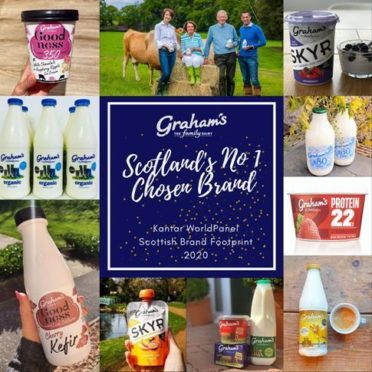
“This year we will continue to offer our doorstep delivery service and develop new products, in response to customer demand. Emphasising how important our brand values are for consumers and how we can reinforce that message, so people can understand that we are a family brand that people can trust.
